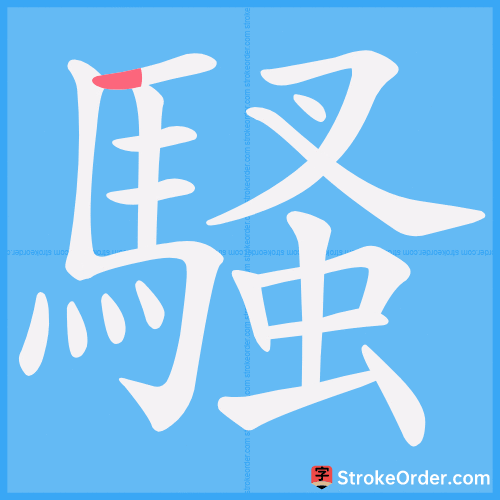騷 Stroke Order
Animated Stroke Order of 騷

Stroke Order Diagrams for 騷

Step-by-Step Handwriting Guide for 騷

Learn to Write Chinese Characters with Video Tutorials
Watch the video of writing the Chinese character "騷", learn the correct stroke order (笔顺) of the character "騷", and master the standard way of writing the character "騷".
Free Printable Handwriting Practice with Stroke Order: 騷
Printable Writing Practice Worksheet of "騷" in Portrait Orientation (Tian Zi Ge)

Printable Writing Practice Worksheet of "騷" in Landscape Orientation (Tian Zi Ge)

Information of 騷
Pinyin
sāo
Radical
馬
Strokes
19 strokes
Usage
★★★
Definition
have sex appeal
騷 sāo
1. 動亂,擾亂,不安定。 [English: Tumult; disturb; upset.]
2. 憂愁。 [English: Worry.]
3. 指中國屈原的《離騷》。 [English: Refers to Qu Yuan's "Li Sao."]
4. 舉止輕佻,作風下流。 [English: Coquettish behavior; vulgar style.]
5. 同“ 臊 ”(sāo ㄙㄠ)。 [English: Same as "臊" (sāo).]
1. 動亂,擾亂,不安定:~亂。~擾。~動。 [English: Tumult; disturbance; unrest: ~ riot. ~ disturb. ~ movement.]
2. 憂愁:“離~者,猶離憂也。” [English: Worry: "Those who are away from ~ are also away from worry."]
3. 指中國屈原的《離騷》,後泛指詩文:~體。~人。~客。風~。 [English: Refers to Qu Yuan's "Li Sao," which later broadly referred to poetry: ~ style. ~ person. ~ guest. Wind ~; (1) refers to ancient poetry or culture such as "Shijing" and "Li Sao"; (2) refers to the light and frivolous behavior of women.]
4. 舉止輕佻,作風下流:~貨。 [English: Coquettish behavior; vulgar style: ~ goods.]
5. 同“ 臊 ”(sāo ㄙㄠ)。 [English: Same as "臊" (sāo).]
騷 sāo (动)
【本义】:刷馬 [English: Original meaning: To brush a horse.]
【造字法】:形聲。从馬,蚤聲。 [English: Character formation: Phonetic compound, composed of horse and an insect sound.]
1. 同本义 ([En.] brush horse)
2. 騷動;動亂 ([En.] tumult; disturb; upset)
3. 通「搔」。抓,撓,以指甲輕刮 ([En.] scratch)
4. 跛行 ([En.] limp)
5. 憂愁 ([En.] worry)
6. 傳:「騷,憂也。」 [English: Legend: "Sao means worry."]
騷 sāo (名)
1. 憂愁 ([En.] worried; depressed)
2. 指屈原的《離騷》的省稱 ([En.] short for Li Sao.)
3. 詩體的一種 ([En.] a literary writing.)
4. 泛指詩文 ([En.] poem; verse.)
騷 sāo (形)
1. 通「臊」。腋臭、狐臭 ([En.] bromhidroses)
2. 賣弄風情的 ([En.] coquettish.)
3. 〈方〉∶雄性的 ([En.] male.)
古通“掃”,盡其所有,掃數出動。 [English: Refers to old usage of "sao," to exhaust all resources, mobilizing everything.]